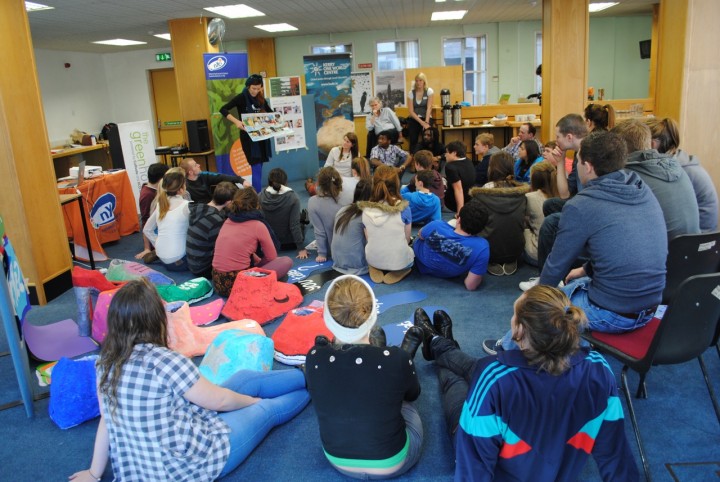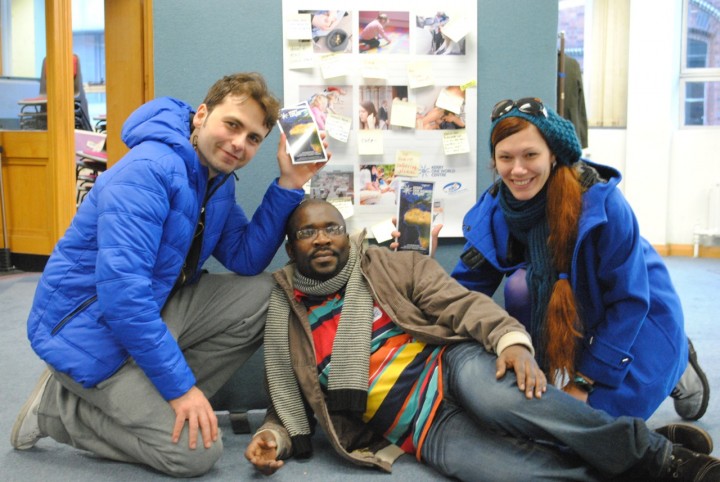Workshop experiences at the Kerry One World Centre draw the attention of participants to look at the MDGs from an local Irish perspective before taking during One World Week 2012. One World Week is a week of youth-led awareness raising, education and action that takes place throughout Ireland during the third week in November every year.
This blog post is part of the 2012 One World Week series.

The Kerry One World Centre recently organised an event as part of its annual One World Week (OOW) activities with young people. This included the preparation of a large poster collage of photos, all relating to the 8 Millennium Development Goals (MDGs). This year’s central event, held in Dublin, collected similar posters from participating groups and displayed them together in a national “living photo-exhibition”.
Why don’t we care about the MDGs anymore?
During the event we talked about the MDGs and reasons why people don’t know anything about them. For instance, more than half of European citizens are not familiar with the concept of MDGs. Some stats from the 2009 Eurobarometer (2009) make sober reading:
- Only one fourth of the EU population have heard about MDGs
- Only 5% of the population says it knows what MDGs are
- 19% are aware that they exist but does not know what they are.
One of the participants went on to ask:
“Why we don’t care enough about the MDGs? Why we are just talking and talking about combating HIV/AIDS or eradicating hunger and poverty in developing countries without taking any actions?”
Large as these kinds of questions may seem, they raise important ideas for us to consider locally. We were trying to combine the topic of MDGs’ with the theme resilience and the strategies for bouncing back – or how to deal with global issues on local level – as the main theme for One World Week 2012.
One of the teachers Dingle went on to explain young people’s need for coping strategies:
“Youngsters are facing many challenges everyday. They don’t want to talk about it openly, but it is there! Maybe they are not that focused on the problems of their peers in Africa or Asia, but they are not completely blind to what is going on.
They are more or less busy about socio-economic problems in their families, un-employment or migration in their country. They’d like to attend university; they would like to earn money and to have the newest IT gadgets in their pockets…”
At the local event we wanted to create a buzz with participants around the poster, based on photographs taken from the centre’s DE photopacks. The question we addressed on poster was clear: “What world do WE want to BE?”
By showing people the poster and photos from photopacks, talking openly and giving them an opportunity to express themselves – such as shouting the first things that come to mind when they see a photo representing one of the MDGs – everyone had a chance to reflect openly on what they really think about ‘society’ and problems on other far flung continents, such as the impacts of climate change, intercontinental migration, social conflicts or the continuing rise in child mortality rates.
Bringing the message to Dublin, and back again
Eight photos taken in Ireland were selected for our poster so as to illustrate what each of the MDGs mean to us here in Ireland rather than, typically, African or Latin American photos representing the only places where the MDGs are relevant.
In taking our poster to Dublin on 17th of November for youngsters to get up close with it we were excited about the kinds of reactions it might provoke.

Unsurprisingly, every person had a completely different opinion about each photo – some were interpreted and understood in many different ways. Some of them thought about the situation on the photo in local way, some of them were thinking more globally. Examples of the photos included: a woman changing a car tire instead of man; young guy begging on the street; a mother feeding an underweight child; the motorway packed full of brand new cars etc.
Some of the reactions to our poster included:
“Why we are eating junk food?; I took a school for granted – I never saw it as a privilege!”
“We get too caught up in our own world and often forget others are struggling.”
“I realise how fortunate we are to be born healthy in a family that can feed us.”
“We complain about traffic jams, but would we rather have to walk on these roads for few miles?”
Giving young people a chance to voice their concern for the world around them – locally as well as globally – is an essential part of what One World Week, and development education, is all about.
At the Kerry One World Centre are trying to encourage people to ask themselves all of these questions (not just some of them!) to find out information about connections between the global North and South and how dependent we are on each other.
But it’s not enough just to ask why is the world full of inequality, injustice, social conflicts and global problems. The other side development education involves taking action.
The central One World event in Dublin saw some successful steps towards a fairer world. I hope that in the next few months – especially during Irish EU Presidency in 2013 – we will see more action beyond the rhetoric.
____________________
Explore more…
- Visit our module on the Millennium Development Goals for some of the key debates, downloads, teaching exercises and more
- Visit our cartoon library for MDG themed cartoons
- Keep up to date with One World Week activities at the NYCI website
